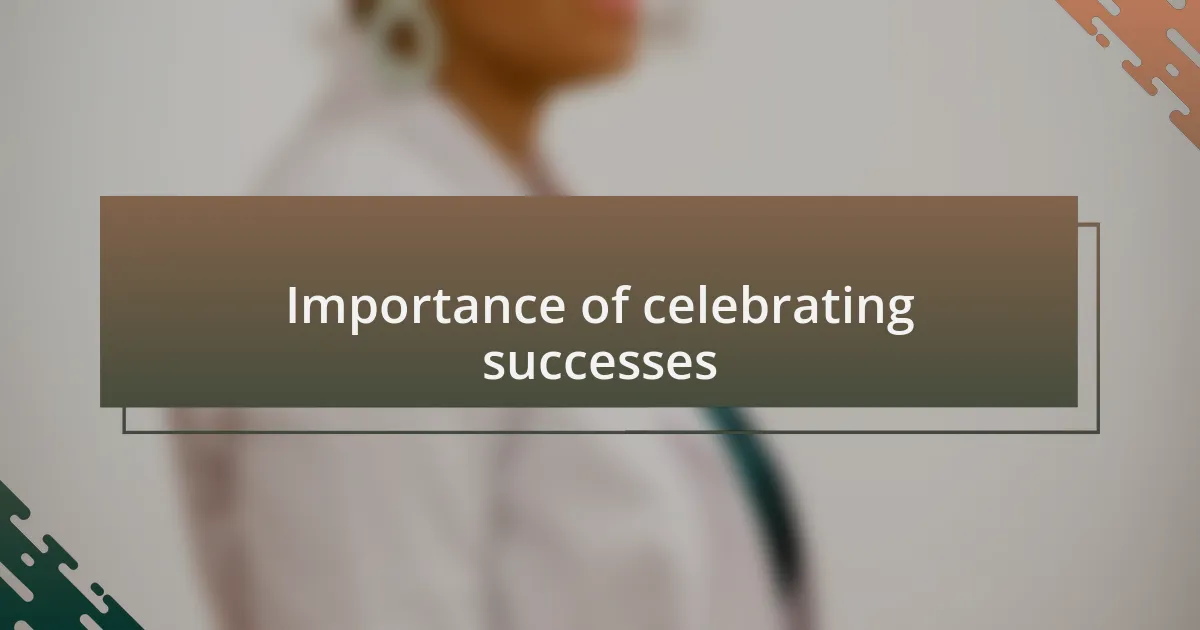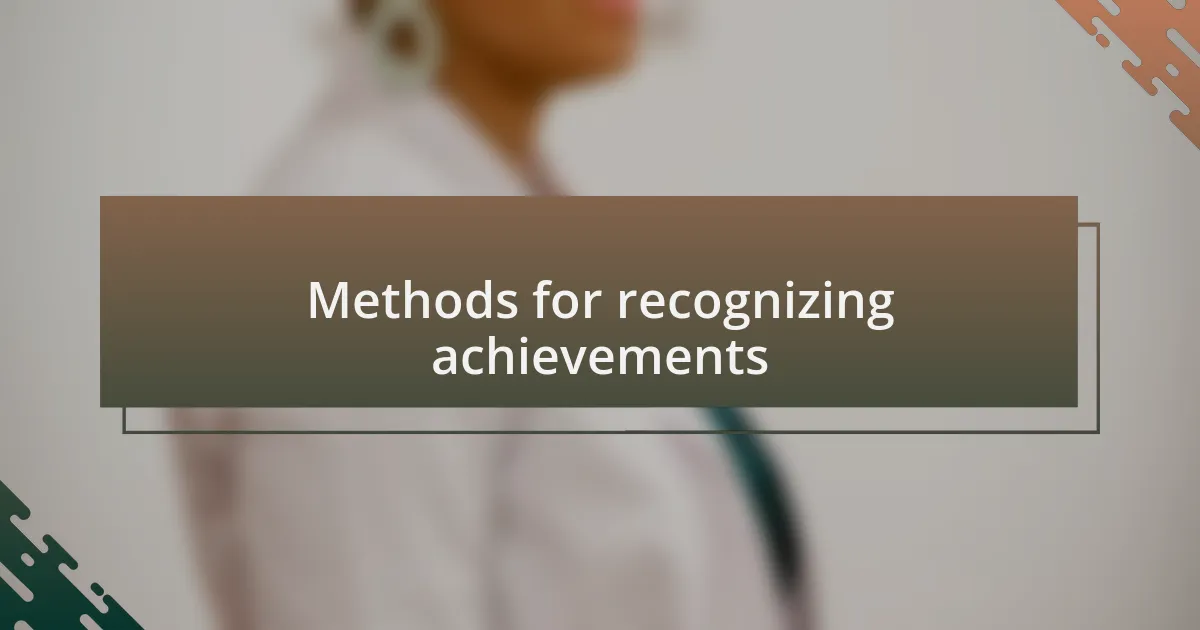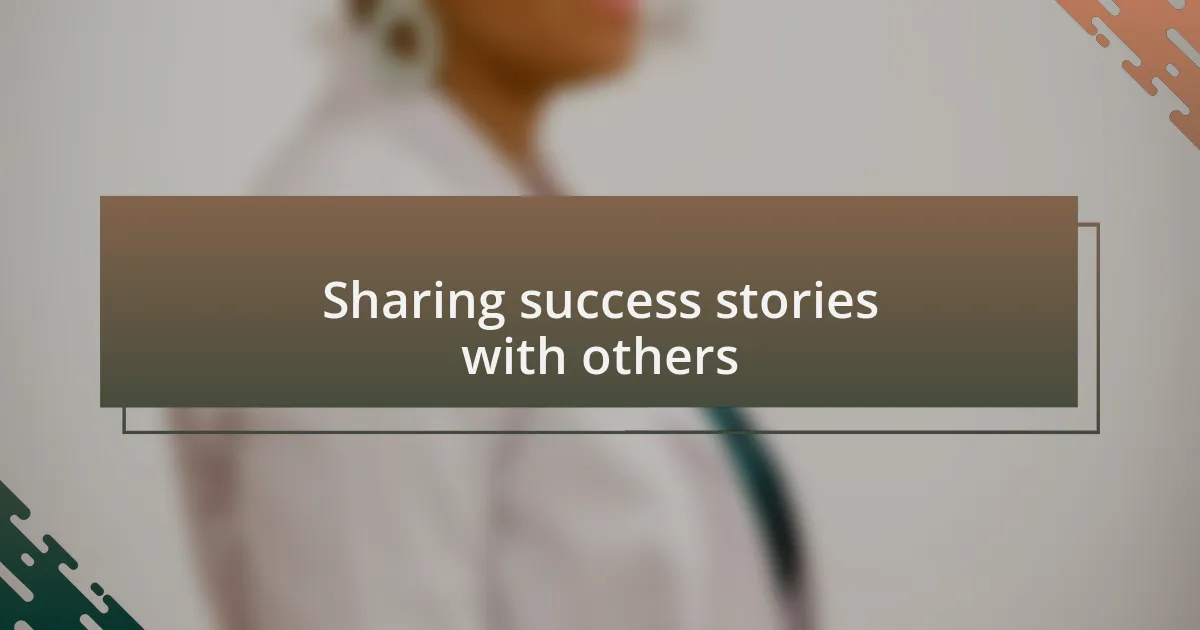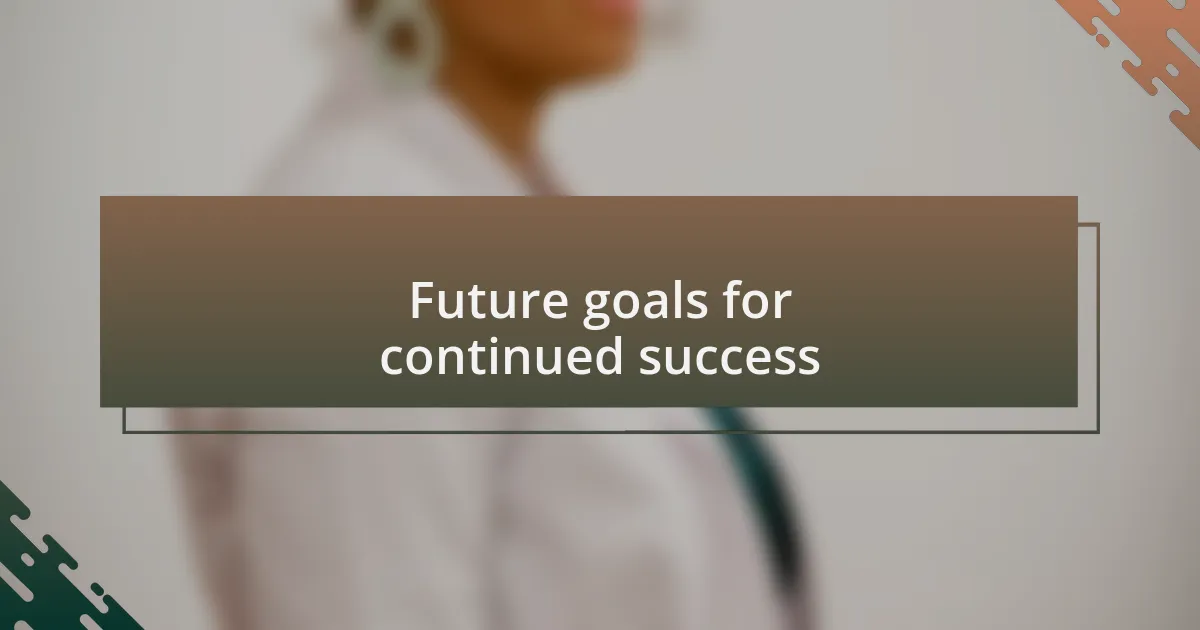Key takeaways:
- Evidence-based health practice combines research, clinical expertise, and patient values, promoting patient engagement in care decisions.
- Celebrating team achievements enhances morale, fosters unity, and reinforces commitment to evidence-based practices.
- Methods for recognizing successes include team celebrations, personalized acknowledgments, and visual displays of achievements.
- Future goals focus on mentorship, advanced data analysis, and celebrating small milestones to sustain motivation and growth.

Understanding evidence-based health practice
Evidence-based health practice is more than just a buzzword; it’s a fundamental approach that integrates the best research evidence with clinical expertise and patient values. I often think about how this combination shapes real-life decision-making in healthcare settings. For instance, I remember a time when a colleague and I debated the best treatment for a patient with complex needs. The research pointed in one direction, but our conversations revealed insights about the patient’s lifestyle and fears that changed our approach completely.
When I reflect on what evidence-based practice means to me, I can’t help but feel a sense of purpose. It’s not just about outcomes; it’s about engaging patients in their own care. How often do we see that pivotal moment when a patient understands their treatment options and feels empowered to ask questions? That’s the beauty of incorporating their values into the equation, making them not just subjects of care, but partners in the journey.
Understanding evidence-based health practice also means recognizing that not all research translates seamlessly into practice. There have been times when clinical guidelines seemed excellent on paper but didn’t resonate with my experiences in the field. This raises the vital question: how do we balance adhering to evidence with the unique realities of each patient’s situation? I’ve learned that nuance matters, and it’s where we, as health practitioners, must navigate the intricate landscape of individual care with empathy and critical thinking.

Importance of celebrating successes
Celebrating successes in evidence-based health practice is crucial for morale and motivation within a team. I remember a time when a group of us worked tirelessly on implementing new guidelines for diabetes management. When we finally saw the positive results in our patients, it felt like a collective win. Recognizing that achievement not only fostered a sense of unity among us but also inspired everyone to strive for further improvements.
Moreover, acknowledging these milestones can serve as a powerful reminder of why we do what we do. After successfully decreasing hospital readmission rates in a timely project, I felt a wave of gratitude toward my colleagues who dedicated countless hours to this initiative. Sharing that victory reinforced our commitment to evidence-based practices, and it pushed us to keep aiming higher. Can’t you feel the energy shifts when a team celebrates a hard-earned win? It’s like reigniting a spark that fuels future endeavors.
Lastly, celebrating successes helps to create a culture of learning and growth. For instance, after recognizing a successful intervention, we gathered to discuss what worked well and what could be improved. I found that these discussions were invigorating; they turned our triumphs into learning opportunities, paving the way for innovative practices ahead. By reflecting on our achievements, we not only honor our efforts but also lay the groundwork for ongoing success in patient care.

Methods for recognizing achievements
One effective method for recognizing achievements is through team celebrations, like casual gatherings or more formal events. I remember organizing a small lunch for our team after we successfully implemented a new patient education program. It was uplifting to see everyone relax and share their individual contributions, reinforcing the fact that we weren’t just colleagues—we were a united team. There’s something truly special about breaking bread together to acknowledge hard work.
Another powerful recognition method involves personalized shout-outs during team meetings. I once shared a moment where a colleague went above and beyond to ensure a seamless transition in our protocol. It was gratifying to see their face light up with appreciation as I highlighted their impact. Personal recognition fosters a sense of belonging and encourages others to take initiative, demonstrating that each of us plays a vital role in the team’s success.
Recognition can also extend to creating visual displays, such as success boards or digital highlights showcasing achievements. In one project, we set up a bulletin board that featured patient stories and statistics reflecting our impact. Walking past that board daily served as a constant reminder of our collective accomplishments and kept the momentum alive. Have you ever found motivation in seeing your efforts displayed? I certainly did—those tangible reminders invigorated our drive to pursue even greater goals.

Personal reflection on accomplishments
Reflecting on my accomplishments brings a wave of satisfaction. One instance that stands out is when I led a quality improvement initiative that reduced patient wait times significantly. I recall feeling an immense sense of pride not just in the numbers but in the tangible relief on our patients’ faces. It made me question how often we celebrate these shifts in patient care and the profound impact they can have on someone’s day.
Another moment that sticks with me was when we received positive feedback from a patient who had benefitted from our new evidence-based practices. I remember sitting in the break room, reading their words aloud to my colleagues, and feeling a collective rush of joy. Have you ever felt that electrifying moment when your hard work is recognized by those you aim to serve? It’s a reminder that our efforts resonate far beyond our workplace, reinforcing the importance of what we do daily.
Finally, I often take a moment to journal about my achievements. It allows me to process my thoughts and appreciate the journey, like when I secured funding for a new health initiative. Writing about my progress brought a sense of closure to that chapter while fueling my enthusiasm for future projects. Isn’t it incredible how personal reflection can shape our aspirations and keep our vision clear?

Engaging your team in celebrations
Engaging my team during celebrations can transform our work atmosphere into one of collective pride and motivation. I remember the day we hit a milestone in patient satisfaction scores; instead of merely acknowledging it, we organized a small gathering where each team member shared their thoughts on what contributed to that success. The energy in the room was palpable, and it felt rewarding to see everyone connect over our shared achievements.
Creating opportunities for team involvement helps deepen the bond among colleagues. I’ve found that celebrating even the small wins, like achieving a goal in a project or completing a training module, invites more collaboration. For example, we set up a “kudos board” in our break room where we can publicly recognize each other’s contributions. This simple act not only boosts morale but also encourages everyone to contribute to a culture of appreciation.
Sometimes, the most meaningful celebrations stem from spontaneous moments. After a particularly challenging project, I organized an impromptu lunch where we could reflect and laugh about our shared experiences. Isn’t it fascinating how these informal gatherings can spark deeper connections and remind us of the human elements in our work? Engaging the team in celebrations reaffirms our commitment to each other and the mission we serve.

Sharing success stories with others
Sharing success stories with others is a fantastic way to create a ripple effect of inspiration. I recall a time when our department achieved a significant reduction in patient wait times. Instead of keeping this success within our team, we presented it at a department-wide meeting. Watching my colleagues’ faces light up as they absorbed our strategies made me realize how sharing these narratives empowers everyone to envision similar successes in their own work.
When I share a success story, I focus on the journey, not just the outcome. For instance, when we implemented a new electronic health record system and saw improvements in patient data management, I invited team members from various departments to join a roundtable discussion. Listening to their challenges and brainstorming solutions together created an atmosphere of collective learning. It was an exhilarating experience, emphasizing that our victories are often built on collaboration.
Engaging others in our success doesn’t just motivate; it builds a community united by shared goals. I often find myself asking, “How can we inspire each other through our achievements?” In my view, success stories are more than just accolades; they’re the threads that weave us together in a fabric of support and shared purpose. Each narrative not only boosts our confidence but also serves as a roadmap for others who might be navigating similar challenges.

Future goals for continued success
Future goals for continued success should always reflect both ambition and practicality. Personally, my focus is on establishing mentorship programs that allow seasoned professionals to guide newer team members. I find it incredibly rewarding to share my experiences and help others navigate their own paths; there’s something fulfilling about fostering growth in others while strengthening our collective knowledge.
Moreover, I aim to enhance our data analysis capabilities to further support an evidence-based approach. Just the other day, I pondered, “How can we leverage our successes to inform future decisions?” Implementing advanced analytics tools will enable us to not only track our outcomes but also preemptively identify areas that need attention. This proactive approach excites me because it empowers us to learn continuously from our achievements.
It’s crucial to set objectives that inspire both individual and team progress. As I reflect on our journey, I think about how celebrating smaller milestones can keep motivation high. By focusing on incremental improvements, we cultivate a mindset that views each achievement as a stepping stone toward larger goals. After all, isn’t it the little victories that often pave the way for the bigger ones?